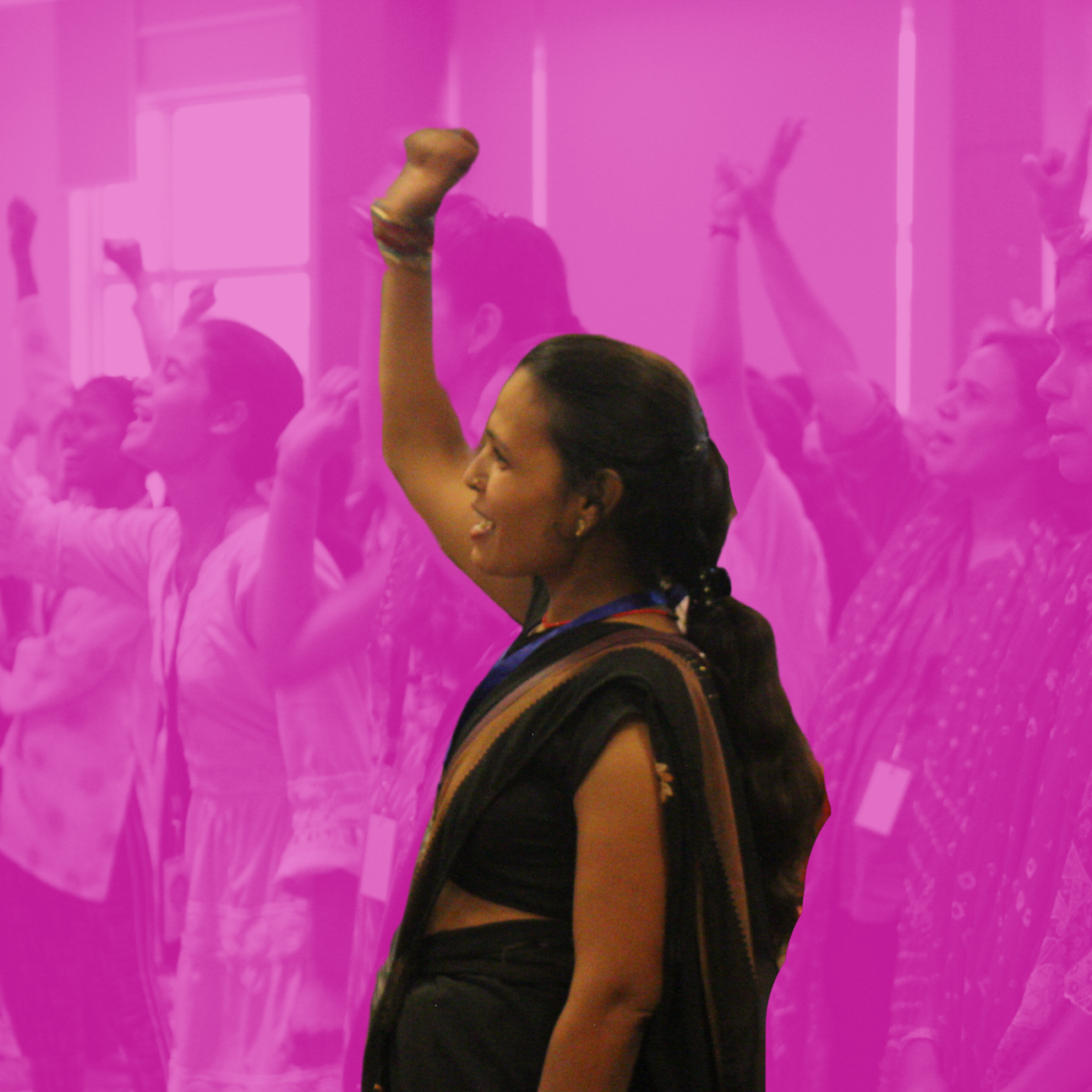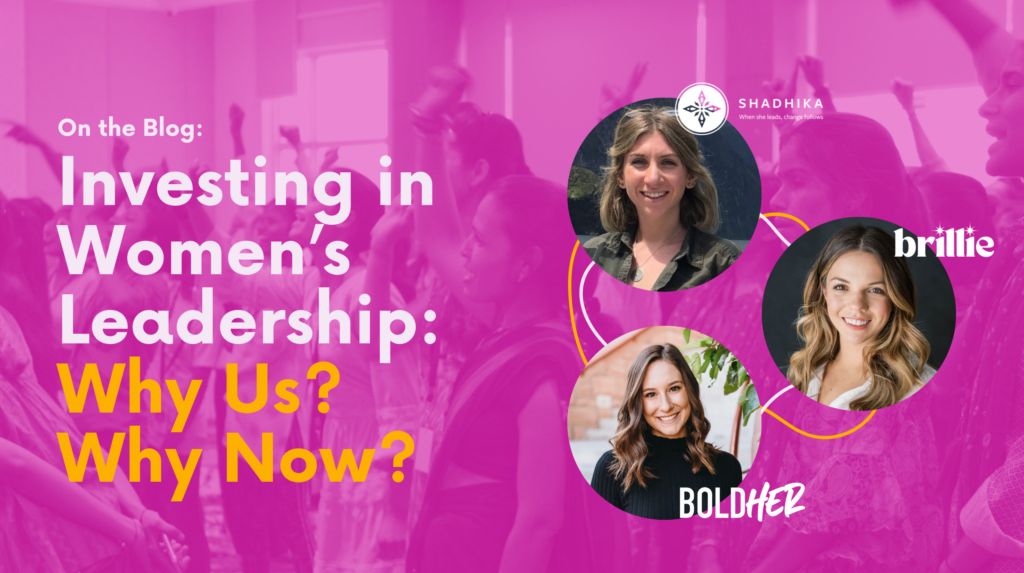
An investment in a girl is an investment in everyone’s future.
Jenna Sweig
When She Leads: Investing in Women’s Leadership: Why Us? Why Now?
October 9, 2023
Reading Time: 7 minutes“Invest in Girls’ Rights: Our Leadership, Our Well-being”, proclaims the tagline for this International Day of the Girl. Across the globe, the percentage of seats held by women in national parliaments in 2022 was at just 26.5%. The current global labor force participation rate for women is under 47% – 25 percentage points lower than it is for men. Research shows that increased participation of women in the labor force, in parliaments, and in public decision making has overwhelming benefits for countries’ GDP and growth towards a more equitable and inclusive future.
But what does it mean to invest in girls’ leadership? Why is it important to come together in collective action to support community-led grassroots efforts?
Let’s hear from Yaz Ketcherside, President of BoldHER – a nonprofit organization that empowers women to make bold moves, and Kaliela Osha, the Founder of Brillie, an organization dedicated to combating the workplace gender gap by empowering more women to reach leadership roles quicker. Yaz and Kaliela spoke with Jenna, the Development Officer at Shadhika on the vision that BoldHER, Brillie, and Shadhika share to build a gender just future through investing in women’s leadership on a global scale.

On the power of the collective – Why must we all come together?
Yaz: The phrase ‘Your success is my success’ encapsulates the crux of collective action for me. At BoldHER, as a collective fighting for change, there is power in seeing community members thrive, make a difference, and bring change to the cause we are all fighting for. When there is a ‘win’ in women’s rights and empowerment, there is a win for all of us.
Kaliela: The spirit of collective action is a shared commitment to gender justice and recognizing that the challenges women face transcend borders and cultures. Brillie’s partnership with Shadhika and BoldHer exemplifies this spirit and by coming together, we’re able to amplify our impact and demonstrate that gender equality is a universal cause.
Jenna: Being conscious in collective action means adopting a feminist mindset of abundance rather than the scarcity mindset that can at times be drilled into us in a capitalist society. Collective action is woven into everything we do at Shadhika – when we bring the Scholars together, when we interact with other nonprofits, and when we work with our donors. For many people, their giving capacity on its own may not be enough to fund a movement. However, when joined in allyship with other gender justice supporters, there is the ability to move mountains of stigma, oppression, and inequity. Collective action fuels sustainable change.

On solidarity across borders – What does it mean to be an ally?
Jenna: This is a big question, there is so much we can do as allies. I think the first thing to consider is that grassroots and community-centered work is key. Men should not be dictating solutions for women, white women should not be dictating solutions for women of color, and cis-gender women should not be dictating solutions for gender-queer people. As allies we must recognize these power relations and make space at the table for other voices who are facing barriers that we aren’t. This can be done by listening, learning, seeking out media sources that are run by women and other marginalized folks, checking our ego at the door, and surrendering power – as difficult as some of these steps can be. Most importantly, we must put our money where our mouth is and give to women and girls’ movements. Even a college student can afford $10 per month. That is $120 per year. And our giving capacity can be adapted as our careers grow or contract. Giving consistently to organizations that are working toward a vision of the future that we want to see is a powerful act of allyship.
Yaz: Being an ally to organizations like Shadhika entails providing support, education, and active involvement. Our shared mission to support women means that when one of us succeeds, it’s a win for us all. Women in the United States, as distant as we are from the contexts within which Shadhika works in India, can play a crucial role by raising awareness about gender injustice issues and advocating for change within their networks.
Kaliela: To add to Yaz’s point, being an ally to grassroots gender justice work in India and globally means recognizing the unique challenges women face in different contexts and actively supporting their efforts to create a more equitable society. It involves listening, learning, and collaborating with organizations and communities across the world to address challenges in pursuit of common goals. Women in the U.S. can stand in solidarity by supporting organizations like Shadhika and amplifying the voices of girls and women worldwide.

Our time is Now – Why must we invest in gender justice NOW?
Yaz: As the world has evolved, so have our needs. For many decades, we have accepted leaders who embraced competitive, assertive, and hierarchical decision-making. However, the qualities we need from our leadership teams now look different than they did pre-pandemic. We need leaders who are inclusive, empathic, and collaborative. Advocating for more inclusive and equitable representation within decision-making groups is absolutely critical to achieve this.
Kaliela: The tagline ‘Our Time is Now’ resonates deeply with me because it encapsulates the urgency of investing in women’s leadership. Today, still only 26% of executives in the US are women, with women being paid on average 22% less than their male counterparts (a gap that has remained quite stable over the past 20 years). When women are equally represented in leadership roles where decisions are made and innovation is driven, organizations thrive and societies progress.
Jenna: To add to this, the gender wealth gap is even greater than the gender pay gap. On top of that, less than 2% of philanthropic funding is dedicated to organizations specifically benefiting women and girls. This is despite the fact that it has been proven time and time again that investing in women and girls is truly the tide that lifts all boats. Here at Shadhika, we see that with each Scholar. When we invest in their education they are able to avoid early, forced marriages and instead grow as community leaders – bringing clean drinking water to their communities, stopping instances of human trafficking, raising peer awareness on health and education, and more. An investment in a girl is an investment in everyone’s future.

Join us in this movement for gender justice, alongside our partners working with the most underserved communities in India. You can invest in the power of the individual girl, and support grassroots leadership in India today!
Read more